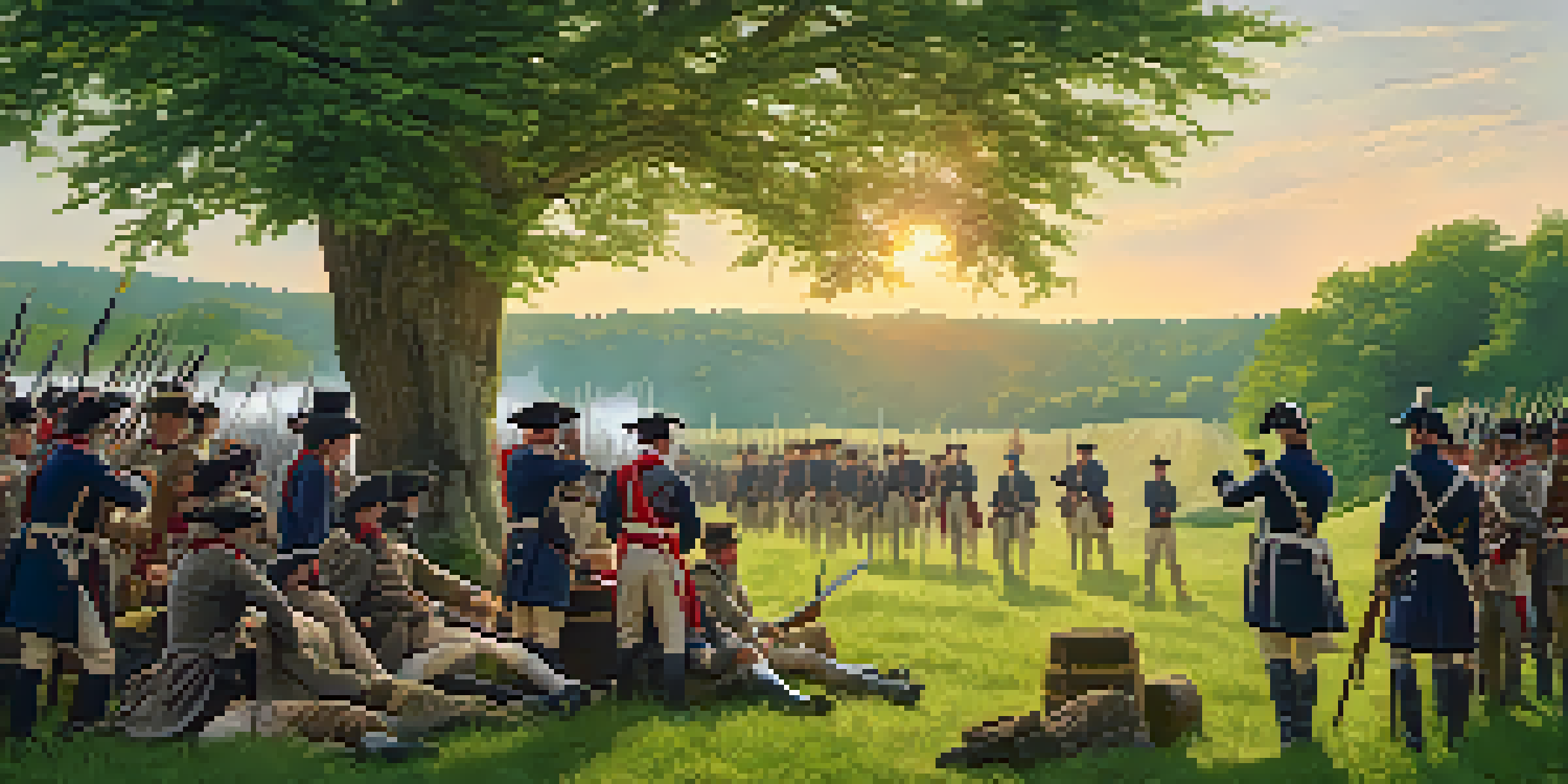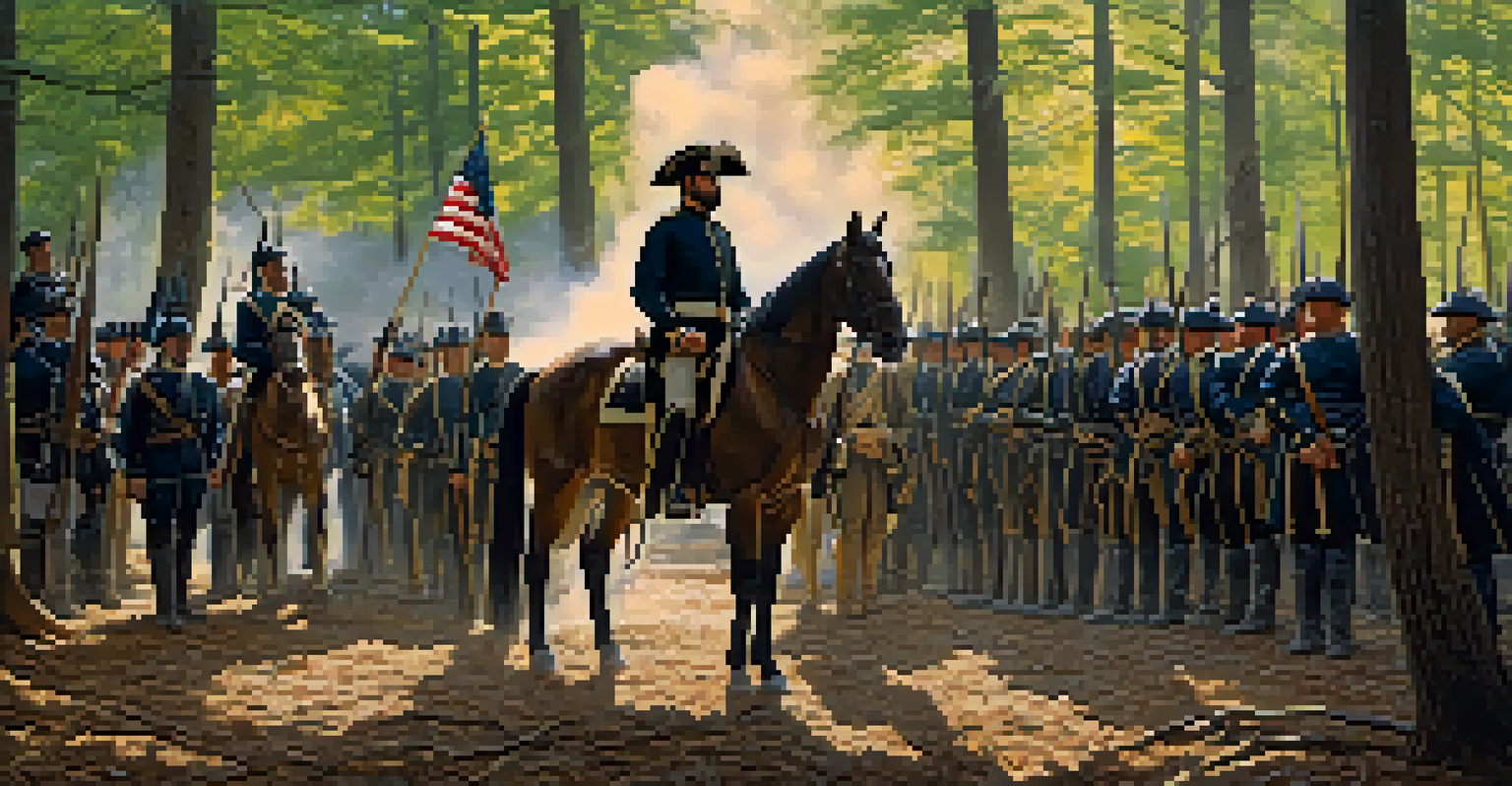The Battle of Charlotte: A Key Event in Revolutionary War

Overview of the Battle of Charlotte
The Battle of Charlotte, fought in 1780, was a significant conflict during the American Revolutionary War. This battle took place in North Carolina, where local patriots faced British forces looking to assert control. While not one of the largest battles of the war, it played a crucial role in the Southern Campaign and the fight for independence.
The price of freedom is eternal vigilance.
Charlotte, at the time, was a growing town, making it a strategic location for both the British and the American patriots. The clash represented not only a military engagement but also a battle of wills between loyalists and revolutionaries within the community. It showcased the determination of the colonists to resist British rule despite overwhelming odds.
The outcome of the battle, although not a decisive victory for either side, had lasting repercussions. It galvanized support for the patriot cause and demonstrated the resolve of local militias. Understanding the nuances of this battle helps us appreciate the broader context of the Revolutionary War.
Key Players in the Battle
Several notable figures emerged during the Battle of Charlotte, each playing crucial roles in the unfolding events. Among them was General William Lee Davidson, who led the American forces with strategic acumen. His leadership was instrumental in organizing local militias and rallying support against the British.

On the opposing side, British General Cornwallis sought to crush the resistance in the South. His efforts to secure North Carolina were met with fierce resistance from the patriots, highlighting the tension between the two forces. The clash of these leaders not only influenced the battle’s dynamics but also shaped the overall strategies of both sides.
Battle of Charlotte's Significance
The Battle of Charlotte played a crucial role in galvanizing support for the patriot cause during the American Revolutionary War.
The interactions and confrontations among these key players illustrate the personal stakes involved in the conflict. Their decisions and tactics had far-reaching consequences, ultimately affecting the course of the war. This battle was as much about leadership as it was about military might.
Tactical Approaches Used
The tactics employed during the Battle of Charlotte reveal much about the military strategies of the time. The American forces primarily relied on guerrilla warfare tactics, utilizing the element of surprise and knowledge of the terrain. This approach allowed them to counter the more traditional formations of the British troops.
In the end, we will remember not the words of our enemies, but the silence of our friends.
Conversely, the British army, accustomed to conventional warfare, struggled to adapt to the hit-and-run style of the patriots. Their attempts to maintain control often led to overextension, which the Americans exploited effectively. This battle showcased the evolving nature of military strategy during the Revolutionary War.
These tactical decisions were critical in determining the battle’s outcome, as they highlighted the strengths and weaknesses of both sides. The innovative methods used by the patriots would later inspire other revolutionary movements worldwide. Understanding these tactics provides insight into how smaller forces can successfully challenge more powerful opponents.
Impact on Local Communities
The Battle of Charlotte had profound effects on local communities, altering the social and political landscape of the region. For many residents, the conflict intensified loyalties and divisions, pitting neighbor against neighbor. This local strife was emblematic of the broader national conflict, as personal stakes in the war became increasingly pronounced.
Patriots and loyalists alike had to navigate the complexities of their allegiances, often leading to difficult choices about loyalty and survival. The battle’s aftermath saw many families torn apart, with some supporting the British while others joined the revolutionary cause. This tension fostered a climate of distrust that would linger long after the fighting ceased.
Key Leaders Shaped the Conflict
General William Lee Davidson and British General Cornwallis were instrumental figures whose strategies influenced the battle's dynamics.
Moreover, the battle mobilized communities to rally behind the patriot cause, fostering a sense of unity among those who sought independence. It ignited a spirit of resistance that would resonate throughout the South, laying the groundwork for future victories. The impact on local communities illustrates how war can reshape identities and alliances.
Consequences of the Battle
Although the Battle of Charlotte did not yield a clear victor, its consequences were far-reaching. The engagement served as a rallying point for patriot forces, inspiring further resistance against British rule. Many soldiers returned home with renewed vigor, ready to continue the fight for independence.
Additionally, the battle highlighted the fragility of British control in the South, prompting a reassessment of their strategies. As the British forces faced increasing challenges, their hold on the region weakened, setting the stage for subsequent battles. This shift was critical in the larger context of the Revolutionary War.
In essence, the Battle of Charlotte contributed to the momentum of the patriot cause, demonstrating that the fight for independence was far from over. The events that unfolded there reverberated throughout the American colonies, reminding everyone that the struggle for freedom was a collective effort. Its consequences continued to shape the course of the war.
Commemoration and Legacy
Today, the Battle of Charlotte is remembered as a pivotal moment in the Revolutionary War, with various memorials and historical sites honoring those who fought. Local historians and organizations work tirelessly to preserve the memory of this conflict, ensuring that the sacrifices made are not forgotten. Educational programs and reenactments help keep the spirit of the battle alive for future generations.
The legacy of the battle extends beyond its immediate outcomes, serving as a reminder of the resilience of those who fought for freedom. It symbolizes the collective struggle of many individuals who believed in the cause of independence, regardless of the odds. This shared history fosters a sense of pride and unity among communities today.
Tactical Innovation in Warfare
The American forces employed guerrilla warfare tactics, showcasing an evolving military strategy that would inspire future revolutionary movements.
Reflecting on the Battle of Charlotte allows us to appreciate the complexities of the Revolutionary War and its enduring impact on American identity. The lessons learned from this conflict continue to resonate, reminding us of the importance of standing up for our beliefs. The commemoration of this battle underscores the values of courage and perseverance that define the American spirit.
Conclusion: The Battle's Importance
In conclusion, the Battle of Charlotte serves as a vital chapter in the narrative of the American Revolutionary War. Its significance lies not only in the events that transpired but also in the broader implications for the struggle for independence. This battle highlights the determination of local forces and the evolving nature of military conflict.
The lessons learned from Charlotte remind us that every battle contributes to a larger story, shaping the course of history in ways we may not immediately recognize. The courage of those who fought there continues to inspire modern movements for freedom and justice around the world. Understanding this battle enriches our appreciation for the sacrifices made in the name of independence.

As we reflect on the Battle of Charlotte, we honor the legacy of the patriots who fought for a vision of a free and independent nation. Their struggle reminds us that the fight for liberty is ongoing and that we must remain vigilant in defending our values. The battle's importance endures, serving as a beacon of hope for all who seek freedom.